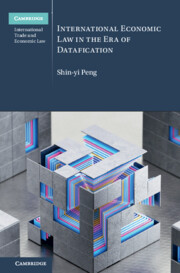Refine search
Actions for selected content:
6 results
Weathering the Storm: US Trade Policy Beyond Trump
-
- Journal:
- International Organization / Volume 79 / Issue S1 / December 2025
- Published online by Cambridge University Press:
- 20 November 2025, pp. S194-S208
- Print publication:
- December 2025
-
- Article
-
- You have access
- Open access
- HTML
- Export citation
11 - The “Crisis of Success” and Peaceful Change at the WTO and within the Global Trading System
- from Part III - Practice
-
-
- Book:
- International Organizations and Peaceful Change in World Politics
- Published online:
- 30 January 2025
- Print publication:
- 06 February 2025, pp 249-272
-
- Chapter
- Export citation

International Economic Law in the Era of Datafication
-
- Published online:
- 28 March 2024
- Print publication:
- 04 April 2024
-
- Book
-
- You have access
- Open access
- Export citation
8 - Trade, the G20 and the EU
-
-
- Book:
- Coherence of the European Union Trade Policy with Its Non-Trade Objectives
- Published online:
- 19 October 2023
- Print publication:
- 02 November 2023, pp 208-235
-
- Chapter
- Export citation
6 - Gender-Inclusive Governance for e-Commerce, Digital Trade, and Trade in Services
- from Part II - Current Issues in Gender Equality and Trade Policies
-
-
- Book:
- Trade Policy and Gender Equality
- Published online:
- 05 October 2023
- Print publication:
- 19 October 2023, pp 120-153
-
- Chapter
-
- You have access
- Open access
- HTML
- Export citation
12 - The Problem of Governance of the Multilateral Trading System
- from Part V - World Trade Governance and Systemic Reform
-
- Book:
- Revitalizing the World Trading System
- Published online:
- 22 June 2023
- Print publication:
- 06 July 2023, pp 359-381
-
- Chapter
- Export citation
